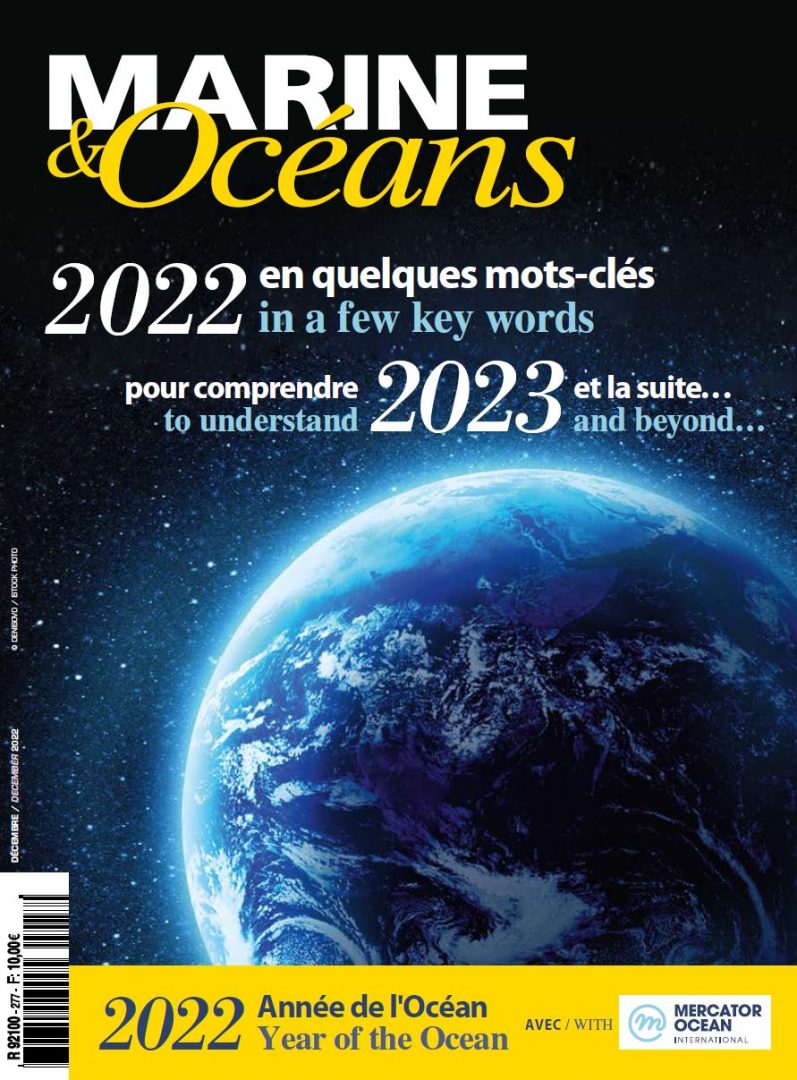Mercator Ocean International’s ambition is to build a reliable and accessible ocean information and forecasting system based on a strong scientific foundation. For this future intergovernmental organisation, born in France nearly thirty years ago, 2022 will have been an authentic “blue year”, with the achievement of its model built on the balance of four distinct forces. Explanations.
It nearly took three decades to build Mercator Ocean International. Each of these allowed us to prove new capabilities and to go beyond our limits, but also, looking back, to learn from it and understand that its efficiency relies on a smooth balance between four equally important forces: science, service, engineering, and governance.
Mercator Ocean International’s first decade (2000-2010) was French and reflected the visionary ambition of its six French founders (1): to describe and predict the physical and biogeochemical condition of all the world’s oceans and develop the first online oceanographic services to access these ocean forecasts. Our scientific skills and know-how were thus decisive and played a founding role.
In fact, science is the fundamental pillar of our organisation and the primary force of our balance today. The proof and recognition of our commitment came in June 2022, at the United Nations Ocean Conference in Lisbon, when the Intergovernmental Oceanographic Commission of UNESCO (IOC-UNESCO) gave us the honour of being designated as the United Nations Decade of Ocean Science’s Global Collaborating Centre for Oceanography and Digital Forecasting.
Our second decade (2010-2020) was European, with the development and operation of the first versions of the European Union’s Copernicus marine service. To date, this service counts over 450,000 users and 45,000 subscribers worldwide. To achieve this result, we developed additionnal skills and capacities: building teams and implementing methods to meet users’ needs, capitalising on levers and influence, getting to know the markets, structuring our offer, developing products for specific targets…
Delivering services is, in fact, the second necessary force for Mercator Ocean International’s balance. It is based on our ability to provide use value to a very large number of users, now and in the future. We do so on behalf of large public organisations: ocean science is thus envisaged in a perspective of service to society, whether for its public policies, its blue economy or the education of its citizens to the stakes of sustainable oceans.
This capacity led to our partnership agreement with the Science Division of the United Nations Environment Programme (UNEP) in July 2022, notably to contribute to UNEP’s Global Environment Monitoring System-Ocean, a platform of ocean data and indicators helpful to UN member states, particularly the most vulnerable.
Our third decade (2020-2030) has begun and it will be global. Ocean issues are now recognised as global issues, just like the environment, biodiversity and climate change. The Digital Twin of the Ocean plays a central role here. The reason is that the development of high-resolution interactive digital ocean models, super-powerful cloud infrastructures and artificial intelligence (AI) capabilities will boost digital innovations, which are indispensable for addressing biodiversity, environment and climate issues.
The digital twin of the ocean that we are building will provide many new functionalities for developing predictive scenarios, for analysing the impacts of public policies at different scales, for testing adaptation solutions to climate risks, for integrating and combining other data sources with existing data, and for transforming complex data into knowledge accessible to the greatest number of people in our society. The expertise in large software systems developed in the science of digital oceanography, and the expertise in operational engineering distributed throughout Europe for Copernicus, has been particularly helpful in preparing us for this new stage. The European Commission certainly made the right decision in embarking on the realistic challenge of creating a European Digital Twin of the Ocean.
By organising the very first Digital Ocean Forum in April 2022 with the European Commission and the French Ministry of Research, we laid the foundations for a collaborative initiative by a large community of scientific and technical experts to work together to build a Digital Twin of the Ocean by 2025-2030 (2). The third force of our overall balance is undoubtedly the engineering of large systems. A force illustrated by our ability to meet the technological challenges of the digital environment within a dedicated team, already in place, and open to young talents worldwide.
The fourth force we need to keep our balance strong and stable concerns our governance. Mercator Ocean was created by French public institutes to contribute to an effort of open knowledge. Five associates from four other countries (3) joined in 2017. This was a decisive step in consolidating our position as the leading reference in European operational oceanography and in addressing the challenges of the establishment of the European Copernicus Marine Service.
But since 2017, things have become much more demanding: access to ocean knowledge has become a priority axis for the UN Decade of Ocean Science as it is for the European Union’s agenda for ocean governance and for the “Mission Ocean” (4). World and regional institutions have huge expectations in terms of ocean knowledge. Mercator Ocean was built on a principle of openness and inclusion. Here again, it is essential to accelerate.
In February 2022, on the occasion of the One Ocean Summit organised by France in Brest, the President of the French Republic, Emmanuel Macron, announced the necessary transformation of Mercator Ocean International into an intergovernmental organisation. Six states signed the Brest Declaration which prefigures this new organisation, comprising France, Spain, Italy, Norway, Portugal and the United Kingdom, soon to be joined by other coastal states. A major and necessary transformation to make the Digital Ocean the focus of a true inter-state alliance and cooperation.
Science, service, engineering, governance, this four-vertex tetrahedron is not just a simple mental representation, but the result of three decades of learning, experience and evolution of our organisation. 2022 has highlighted how fundamental this balance will be in developing and managing our next Digital Ocean Twin to serve our future Member States, the EU’s green and digital transition and the UN’s ambitions for the oceans.
- CNRS, CNES, Ifremer, IRD, Météo France and SHOM
- Read the major report on Mercator Ocean International and the Digital Ocean Twin project in Marine & Oceans n°274 – 1st quarter 2022
- Spain, Italy, Norway and the United Kingdom
- Mission “Regenerating our Ocean and Water by 2030


